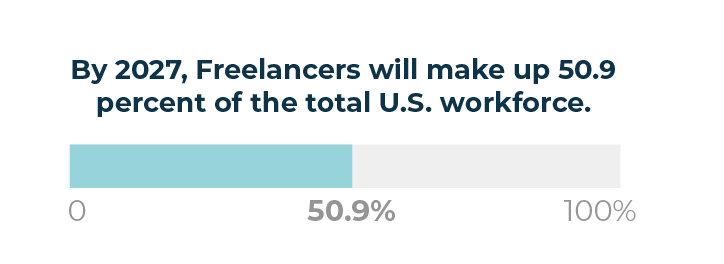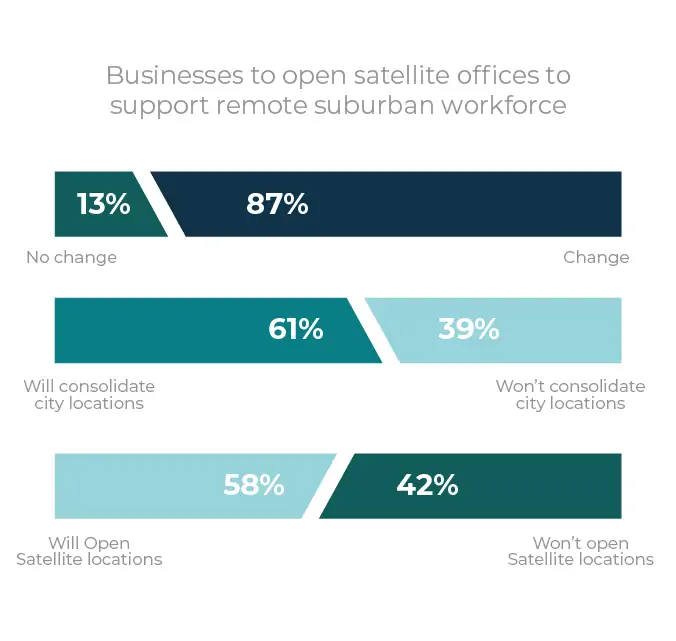Q: What is a freelance worker?
A: A freelance worker is an independent professional, who is self-employed and hired to work for different companies on particular tasks or projects.
Need a little extra help with your business, but don’t want to hire a full-time employee?
Enter the freelance worker.
Whether you need a new logo, weekly blog content, regular bookkeeping, or even someone to answer your phone calls, freelance workers cover virtually every skill and business requirement imaginable.
In this guide, we’ll explore the concept of hiring freelancers and how this army of flexible, talented workers can help your business thrive and grow.

What is Freelancing?
Freelancers take care of their own work schedules, taxes, insurance, and invoicing. They market their own services, often through their own website, social media, and freelance job sites, and may be paid by the hour or on completion of a project.
They are sometimes known as gig workers, as freelance jobs are commonly known informally as ‘gigs’.
Did you know that the term ‘freelance’ originated in the 1800s?
The term is believed to originate from Sir Walter Scott’s Ivanhoe, in which a lord refers to his paid army of ‘free lances’.
They were independent medieval mercenaries who were paid to fight, which explains the ‘lance’. As for ‘free’, no — freelancers don’t come free. It generally refers to their independence; having no affiliation to one cause or another.
Mercifully, these days freelancers are paid for their digital and creative skills rather than their fighting abilities.
(Perhaps the pen really is mightier than the sword?)
Yet the general meaning — that of an independent who is paid to utilize their skills for a particular job — is more relevant than ever.

Types of Freelance Agreements
Freelance agreements or gigs may be short term, or they might develop into longer-term working relationships.
This is very common in the freelance world and is often known as a ‘retainer’, whereby the freelancer agrees to work a certain number of hours (or provide a certain amount of work) at a specific rate for an agreed amount of time.
What companies need freelancers? Any company can employ freelance workers — but tech companies, or companies that operate online, commonly outsource the most work.
There are multiple benefits of using freelancers. The big one is flexibility; hiring freelancers is faster than taking on full-time employees, therefore companies aren’t tied down with HR red tape and can usually get the job done faster.
This provides enormous value for businesses of all sizes — especially small or mid-size firms with limited resources.
Case in point, freelancing is positively thriving.
Approximately 64.8 million people carried out freelance work in the U.S. in 2020, up from 57.3 million in 2017.
And this figure is expected to keep on rising.
By 2027, it’s predicted that 86.5 million people will be freelancing in the United States and will make up 50.9 percent of the total U.S. workforce.

What’s driving this trend?
The ability to work remotely with the help of WiFi, roaming data and mobile devices, not to mention the corresponding growth in digital and tech-based jobs, is encouraging people to choose a more flexible lifestyle over traditional 9-5 office-based work.
Ever heard of a digital nomad?
Digital nomads maximize the work-from-anywhere trend by combining remote work with travel. They are often freelancers who work flexibly, which allows them to move around and experience new destinations and cultures while earning a living.
Learn more about digital nomads in our guide: How to Become a Digital Nomad
Now, in the era of Covid-19, more people are choosing to work flexibly — and for many, that means setting up their own freelance business.
This is excellent news for business owners.
There are many advantages of using freelancers, including flexibility and cost efficiency. If you need help with a one-off project or someone to help a few hours per month, a skilled freelancer could be ideal.
Q: How do you put freelance workers on your taxes?
A: They usually classify as 1099 workers. Find out more in our guide: W9 vs 1099: What’s the Difference?
But you also need to approach this process in an efficient manner.
When outsourcing work, you need someone who has the right skills, is reliable, can work to agreed timescales, and who will produce work to a high standard.
Let’s take a closer look at what freelance workers can bring to your organization, and what to look for when hiring a freelancer.

Why Hire a Freelancer?
The growing popularity of freelancing means more companies than ever are utilizing this particular subset of the workforce.
Here are some of the main reasons why:
*A word about cost saving.
Hiring freelancers is often enormously cost effective, but that doesn’t equate to cheap labor.
Freelance workers are cost effective because you only pay for the time or specific resources you need, rather than full-time employment.
You won’t be expected to pay for perks and benefits either. But remember that part of the freelancer’s hourly rate should contribute toward their own business costs, including essentials like business insurance, income protection, software subscriptions, and the like.
Therefore a good freelancer won’t necessarily be the cheapest.
You should expect to pay what their skills are worth, bearing in mind that they may have spent many years training and building the right experience.
As the old adage goes, ‘you get what you pay for’ and it’s far more cost efficient to hire the right person who can do the job well once, rather than a less experienced person who needs supervision or training. If it feels a little above what you are prepared to pay, ask for a sample or set a small assignment first. You might just find the perfect person.

What to Look For in Freelancers
When looking for freelance workers, your first requirement is to ensure they can meet your specific requirements.
That means they should have the necessary skills and experience, possibly with qualifications or proven work experience in a particular industry.
But there are other soft skills and requirements you’ll need to look for, too.
Here are some of the key things to look for when hiring freelance workers:
How do you check and verify these things?
If they use a freelance marketplace site (more on that later) check out their online profile or resume and look for reviews and feedback.
They may also have a website and a social media profile; LinkedIn is usually a good place to start.
Look at their work experience and the number of years they have been doing it.
- Does it fit with your current needs?
- Do they have the relevant skills?
- Do they have experience in your sector?
Look at the dates to see when they did the relevant work experience, and how recently; if they have since switched gears or taken a long break, be sure to ask them why.
Look for referrals or feedback from previous clients or colleagues, and major accomplishments such as accreditations.
This isn’t just a box-ticking exercise.
In addition to skills, you are also trying to get an understanding of the person’s character and how well you think they will fit with your team, your brand, and your culture.
And, you might also learn additional information about your candidate, such as extra skills that you might need for other projects.

Where Can I Recruit Freelancers?
The question you’re probably thinking is, how can I hire the best freelancer?
When it comes to finding a great freelancer to help complete your task or project, there are a number of places you can start looking.
The most obvious place is a freelance marketplace. These sites connect freelance workers with companies needing work.
As the freelance sector has grown, so too has the number of platforms and marketplace sites. That means you’re more likely to find the skills you need at a rate you can afford.
We’ve listed the main websites below.
- Upwork: One of the best-known freelance marketplace sites, Upwork covers virtually every type of skill and has a number of useful features, including built-in invoice tools and the ability to chat with potential hires before agreements are made. It’s a trust-driven platform that enables a transparent recruitment process.
- Fiverr: Another big name, Fiverr is so-called because candidates list services starting at just $5, and pricing is project-based, so companies know what they will pay upfront. Payment isn’t released until the work has been approved, so it’s generally popular with budget-conscious businesses.
- Toptal: Toptal prides itself on only listing the very best freelance talent — the top 3%, in fact. That means 97% of applicants to Toptal are rejected. It’s a fully remote company that focuses on skilled professionals in the technology, design, finance, and business management sectors, and takes a commission on successful matches.
- SimplyHired: A job search engine and aggregator. Companies can post a job through SimplyHired, requesting freelance candidates, and have it posted across multiple online job platforms and networks.
- PeoplePerHour: PeoplePerHour is a huge online freelance marketplace covering virtually any freelance skill. It has a high level of competition among freelancers, which means you’re more likely to get a high number of bids (at affordable rates) and the right expertise.
- Freelancer: Boasting 50 million users, Freelancer claims to be the world’s largest marketplace. It’s a mainstream site with a high level of competition and a vast array of skills. Companies can post a job or invite candidates to bid, monitor progress through a time tracker, and live chat with freelancers through the app.
So that’s one way to find great freelancers.
If you’re thinking “how do I hire and pay freelancers?” — these platforms make it easy.
You can recruit, communicate with, and pay your freelance worker through these sites, quickly and easily. Post a job, set a budget, communicate your goals, agree payment terms, and schedule payment on completion of the job.
Remember that once you hire a freelancer through these platforms, the website becomes your agent. Either the freelance worker, or you, will pay a form of commission.
One thing to remember is that there are usually rules restricting you from continuing to work with the freelancer outside of the website. So, check the limitations first.
Of course, there are other ways to find specialized freelance talent beyond marketplace sites.
- Put the word out: Tap your network and ask for freelance recommendations. You won’t get the same flood of competitive bids that you would from marketplace sites, but you are more likely to get experienced, industry-savvy professionals with a proven track record.
- Use social media: Post an update on LinkedIn asking for recommendations. You don’t need to go into detail about the work (after all, your competitors might be listening) — simply state your basic requirements, a rough timescale, and contact details.
- Update your blog or website: Add a post to your blog or a listing to your ‘Careers’ page (if you have one) requesting freelancers to get in touch. State your requirements and an application deadline, and share your content on social media, in your newsletters, and as far and wide as possible.

How to Vet Freelancers
When you’re hiring a freelance worker, you’re not just hiring someone to do a job.
You’re hiring a new member of your team.
It might only be for a few hours, or a month, or possibly more. But the better that person integrates with your company and your team, the more likely you are to build a valuable relationship that can help take your business forward.
Here are some tips to help you vet future freelance candidates:
If at the end of the first assignment you don’t feel the work is up to your standards, or the freelancer isn’t able to stick to deadlines, don’t be afraid to part ways. Be sure to provide helpful and constructive feedback and any due payment for work completed.

Additional Cost-Cutting Methods
We know that hiring freelancers can help companies save money.
After all, staffing costs are typically the largest overhead for businesses. But there are many more ways to cut costs beyond hiring a flexible workforce.
After staff, what’s commonly the second biggest business cost?
You guessed it: commercial real estate.
That’s why for some years now, organizations have been increasingly shifting away from large headquarters toward remote work and flexible workplace locations. Now, after the events of 2020, that trend has accelerated.
After more than a year of working remotely while their offices sat empty, many business leaders have realized that their teams are able to remain productive even while working from anywhere.
So why not keep it going?
Some companies are doing just that, and are reducing their real estate footprint in the process.
Over half (61%) of companies plan to consolidate their office spaces into just a few satellite locations, while 58% plan to open more locations

That means huge cost savings and a team that’s able to work more flexibly from wherever they feel most productive. This also enables workers to save money on commuting and maintain better work/life balance.
Of course, businesses still need somewhere to meet and collaborate.
And that’s where a Virtual Office comes in.
A Virtual Office provides all the essentials you’d expect from a physical office — such as a business address, mail processing services, and a place to meet or work.
The difference is, you don’t pay for full-time office space.
Just like a freelance workforce, you only pay for what you need, when you need it.
Virtual office services are on-demand and flexible, and services can be added or subtracted depending on what you need.
This means the infrastructure can be shared across individuals and businesses, allowing resources to be allocated more cost-efficiently.
When you’re not using office space or meeting rooms in your Virtual Office, on-demand, you can work from home or from a third place, like a coworking space.
It’s a flexible and cost effective way to grow a business.
Check out Alliance Virtual Offices if you’d like to learn more about virtual offices and flexible workplace options near you.

An Agile Workforce Saves You Money
Flexibility enables businesses of all sizes to operate in a more agile and cost-efficient way, and to adapt and react to market conditions faster.
Whether you’re a startup or a large global corporation, a flexible freelance workforce can help strengthen and future-proof your business by providing the right skills, at the right time, from anywhere.
As companies seek to adjust to the current situation and position themselves for recovery, it’s no wonder freelancing and flexible work practices are gaining in popularity.
We hope this guide has helped you to understand the value of using freelancers for your business, and how to hire the right person with the right skills for your needs.














